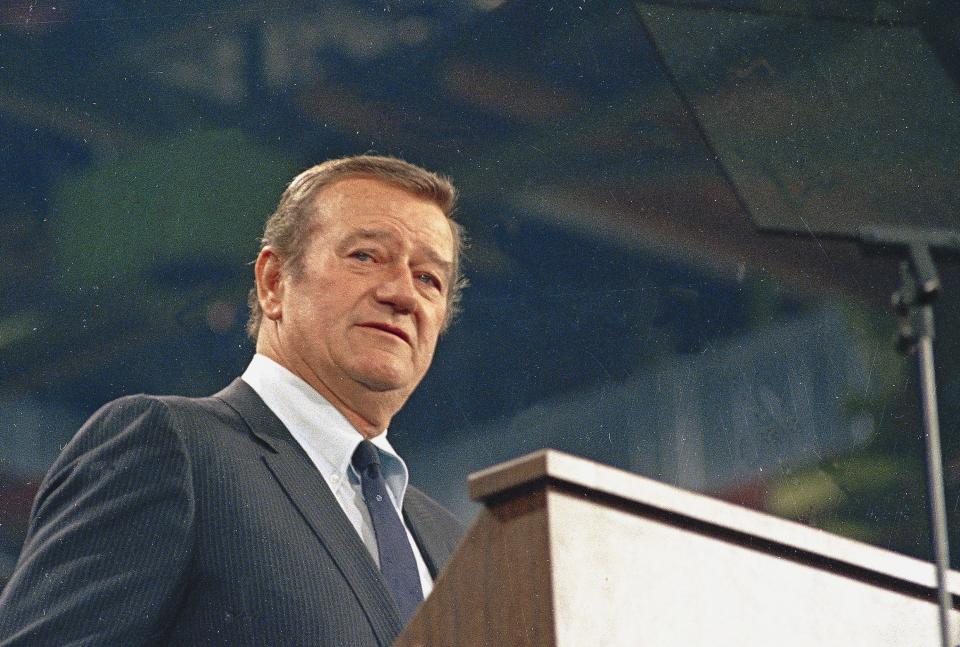NJ-produced film goes inside Oscar winner 'High Noon' starring Gary Cooper, Grace Kelly
- Oops!Something went wrong.Please try again later.
- Oops!Something went wrong.Please try again later.
- Oops!Something went wrong.Please try again later.
- Oops!Something went wrong.Please try again later.
- Oops!Something went wrong.Please try again later.
It takes courage to do the right thing.
That's what Sheriff Will Kane, played by Gary Cooper, learns in the 1952 Western classic "High Noon."
And it's what Cooper learned behind the scenes — by playing himself.
Few people at the time can have been aware that Cooper, off camera, was enacting a drama that weirdly paralleled the story of the film.
"He really did risk his career," said West Milford producer Richard Zampella, whose documentary "Inside High Noon," directed by John Mulholland, will debut on PBS in April. It's available for streaming now.
Carl Foreman, the screenwriter, had been an "unfriendly witness" during the House Un-American Activities Committee. It was the height of the McCarthy era. People were seeing Communists in every cupboard — especially in Hollywood.
So Foreman, in what he knew was likely to be his last movie project, wrote an allegory. An upright sheriff, in 1898 New Mexico territory, learns that four outlaws are arriving in the town station — at high noon — to seek revenge. Everyone in town urges him to leave. No one is willing to stand by him, or stand up to the thugs.
In the end, Sheriff Kane is left all alone to do right, with no help from the cowardly townspeople, or even his own wife (Grace Kelly). After defeating the villains, he throws his badge down in contempt of his fellow citizens who won't even help defend their own democracy.
'Don't do it'
Everyone urged Cooper not to take the role — no one more so than John Wayne, Cooper's friend and an arch-conservative. The idea of a sheriff throwing his badge to the ground incensed him.
"Wayne really pressured him to back out, and told him if he didn't, his career would be over," Zampella said.
It was not an idle fear. Lots of Hollywood careers were destroyed, in the late '40s and early '50s, by even the tiniest taints of communism or even liberalism. Lee Grant, Lena Horne, Orson Welles, John Garfield and Charlie Chaplin were among the actors who would "never work again" (most of them did, eventually).
More:Kids 18 and under go free: How to get the golden ticket to Broadway shows like 'Hamilton'
Moreover Cooper, who had himself testified before HUAC — he didn't name names — was himself a conservative. But some inner moral compass told him that the witch hunts to root out "un-Americans" were themselves un-American.
Still, he worried about his participation in the film. He was not as young, and not as much a box office draw as he'd once been. A bad move could ruin him. He asked for advice from a friend, Ernest Hemingway.
"He said, 'You've gotten in over your head here,' " Zampella said.

But in the end, Cooper stood by producer Stanley Kramer and director Fred Zinnemann. Most courageously, he had Foreman's back.
"Cooper stood up for Foreman," Zampella said. "He said, 'If you take his name off the film, I'll walk.' That was a bold step for him to make at the time."
Cooper — one of the great stars of Hollywood's golden age — is an abiding interest of Zampella, who teamed with Mulholland on several other documentaries about the actor, including "Cooper & Hemingway" and "Sergeant York: Of God and Country." (In 1942, Cooper won an Oscar for playing York, the World War I hero.)
Another of their documentaries, "Elmore Leonard: But Don’t Try to Write,” premiered on PBS in 2022.
In the end, "High Noon" was a big hit. People marveled at its ingenious construction — the film takes place in real time, with the seconds ticking down to high noon — and bought records of its chart-topping Dimitri Tiomkin theme song, "Do Not Forsake Me, Oh My Darlin'," sung by Tex Ritter.
Western buffs, through the years, have dismissed the film, disparaged it as a "sermon." But audiences loved it. Notably, presidents as different as Bill Clinton (interviewed in the documentary) and Ronald Reagan saw it as a great civics lesson.
It won four Oscars — one of them for Cooper, who wasn't able to attend the ceremony. He sent his buddy John Wayne in his place.
"He accepted the award, and claimed he was jealous his agent didn't offer him the role," Zampella said. "He was really disingenuous."
For more information, visit insidehighnoon.com.
This article originally appeared on NorthJersey.com: Oscars: New documentary goes Inside High Noon starring Gary Cooper

